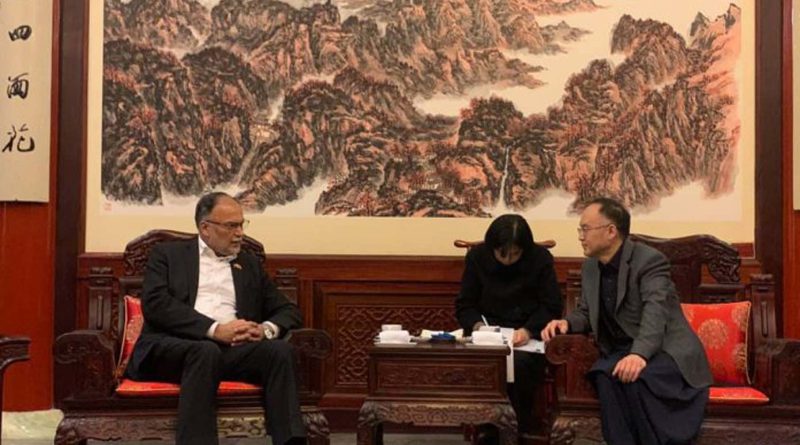Chinese AFM calls on Ahsan Iqbal
Chinese AFM Nong Rong calls on Ahsan Iqbal
CPEC role in rise, economic uplift of China admirable: Iqbal
Pak-China marine cooperation must to eradicate by-catch, raise income
ISLAMABAD: Chinese Assistant Foreign Minister Nong Rong called on Minister of Planning, Development and Special Initiatives Ahsan Iqbal here on Wednesday.
Ahsan Iqbal congratulated Nong Rong for being appointed as the AFM and appreciated his contributions to strengthening bilateral ties, advancing the China-Pakistan Economic Corridor (CPEC) development and promoting the cultural linkages between the two countries during his tenure as the Chinese ambassador to Pakistan.
The minister also conveyed greetings on the successful conclusion of the ‘Two Sessions, an annual parliamentary meeting that gathers delegates from across China to discuss and approve national priorities, wishing the new leadership complete success and expressing confidence that Pakistan- China friendship would touch new heights.
Ahsan Iqbal noted that this year marked the 10th anniversary of Chinas massive Belt and Road Initiative (BRI) and launching of CPEC, and hoped that the two countries could jointly organize a series of events to mark this milestone. In this regard, he informed that Pakistan was planning to hold a special summit with the participation of Chinese leadership. AFM Nong Rong fondly recalled his stay in Pakistan and vowed to continue working for strengthening bilateral relations.
Moreover, Chinese experts have also put forward suggestions from different levels regarding marine ecological protection. Pakistan has very rich marine and inland fishery resources, including nearly 250 species of bottom fish and 85 species of pelagic fish, as well as 15 species of commercial shrimp, 12 species of cephalopods and 5 species of lobsters. Precious fishery resources, as the fairest public goods, require systematic protection measures.
Dr. Zhou Jinfeng, Vice Chairman and Secretary-General of China Biodiversity Conservation and Green Development Fondation, said that in line with the standards issued by the Ministry of Agriculture of China, the minimum mesh size of fishing nets is 25mm. In addition, the setting of closed fishing seasons and areas are of great importance, in which the sea is closed from May 1st to September 1, every year to fully protect marine life during the breeding period, CEN reported. Nevertheless, at the public level, the instillation of awareness including marine ecology and resource protection is a top priority. In this connection, Prof Kiani and Dr. Zhou happened to coincide with each other.
Only by ensuring the income of fishermen, can sustainable fishing methods be implemented more easily, Shoaib Kiani, Assistant Professor at the University of Karachi’s Institute of Marine Science mentioned. Longline fishing allows fishermen to catch more big fish. However, it costs about Rs 900,000 (about USD 3,400) to equip a boat with its equipment, half of which is borne by WWF-Pakistan. So far, a total of 980 fishermen in Ibrahim Hyderi and Rehri Goth are using longlines, and their income has tripled compared to their peers who still use gillnets.
It bodes well for both the ocean and the people. Whereas, only about 4 percent of Pakistans fishing fleet has converted to sustainable methods. Many Pakistani fishermen have an annual income of only USD 2,300, and the cost of installing longline fishing is unaffordable to them. Fishermen will ignore potential future benefits because of the temporary high cost, Dr. Zhou emphasized. The reform of fishing gear requires a multi-pronged approach. Above all, government departments must further increase financial support to ease the economic pressure of fishermen; second, the assistance of relevant international maritime organizations or fishery organizations needs to be strengthened.
In addition, public education, including fishermen and children, can be done with the help of NGOs. All in all, the long-term benefits of reforming fishing gear are greater than the short-term benefits, which fishers must deeply understand, to reach the target of sustainable fishery in the long run.
Both China and Pakistan enjoy long coastlines and diverse marine life species. Therefore, the long-term sustainable cooperation strategy under the CPEC framework is of great benefit. Kiani believes the two countries should cooperate to train fishermen and related ecological protection personnel, and even establish work group to hold regular exchange meetings.
At present, a number of excellent academic papers related to marine biology and ecological protection have emerged in Pakistani academic circles, reflecting our great potential in the field of scientific research and technology The only problem is financial support and resource allocation. Sustained development goes hand in hand with improving fisher livelihoods, which are going to benefit generations to come.
Prof Kiani said that fish population in Pakistan’s waters have fallen by 40-80 percent. Fishery reform is imperative, in which rescue and safe release programme is not enough. Prof Kiani describes longline fishing using a single fishing line, along which are hung as many as 4,000 baited hooks, and sub-surface gillnets as a suitable fishing practice, stating that entanglement of threatened and endangered species has been significantly reduced where the WWF-Pakistan measures have been adopted.
There is still a need to raise awareness among fishers, and for the government to regulate fishing practices. Other new equipment can reduce bycatch at the source. According to Prof Kiani, fishing gears equipped with LED lights has been distributed to fishermen in some pilot areas, which can reduce the impact on non-target species such as sea turtles under various light conditions.




